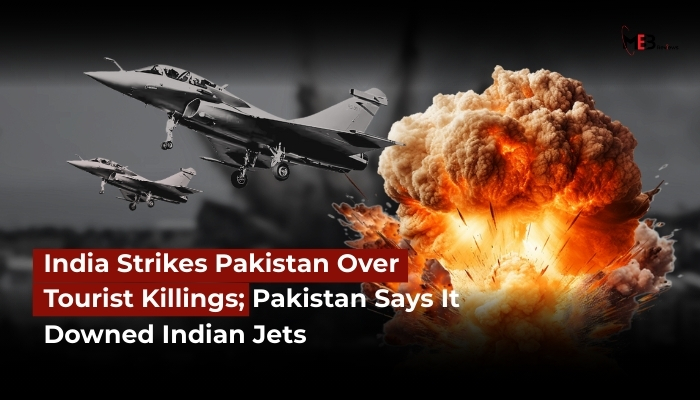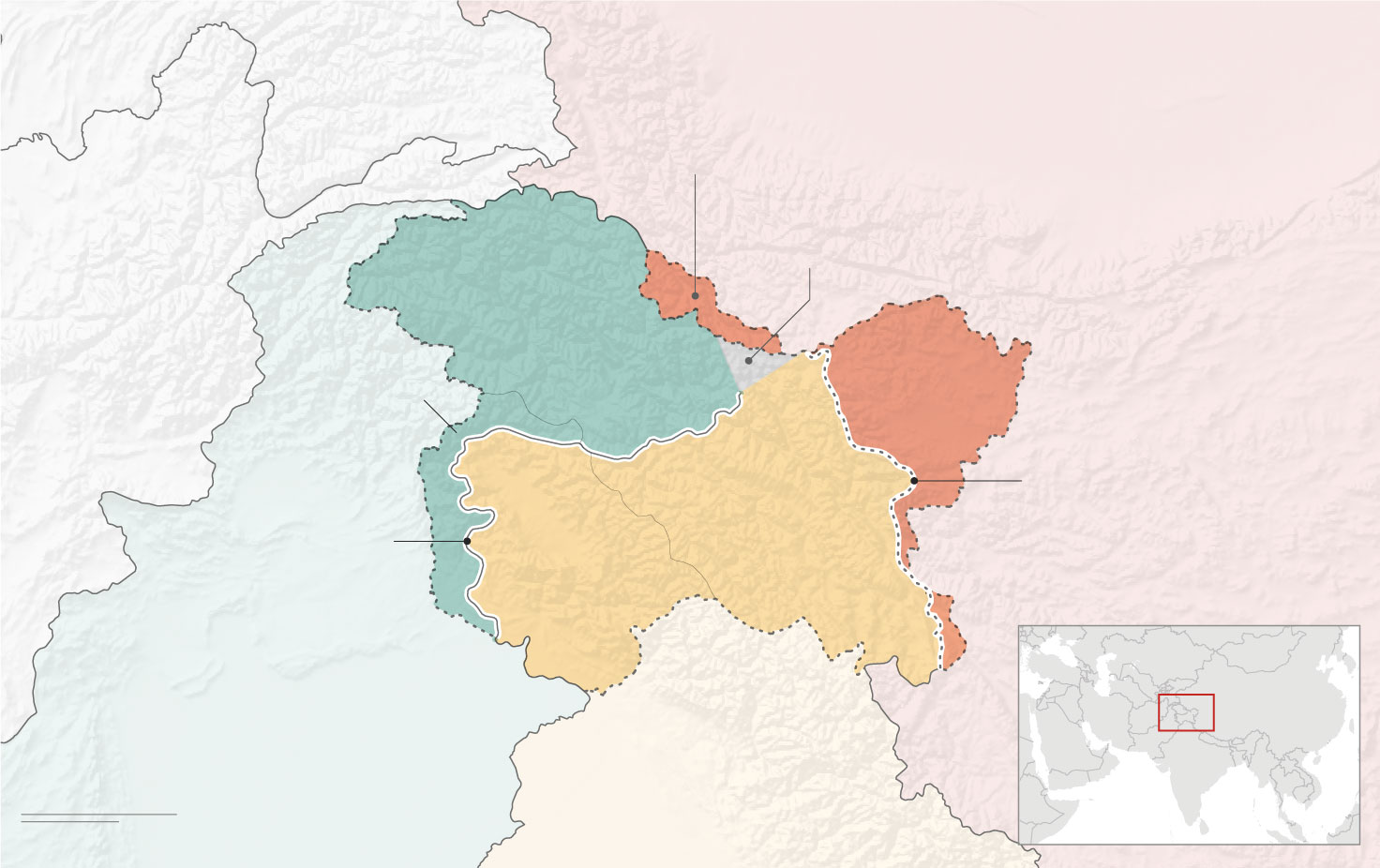Escalating tensions in South Asia as New Delhi responds to deadly attack, while Islamabad asserts it has retaliated by downing enemy than 50 years

India Strikes Pakistan; Jets Downed Amid Rising Tensions
India carried out military strikes on targets inside Pakistan, officials from both nations confirmed on Wednesday, prompting a sharp escalation as Pakistan claimed it had downed five Indian Air Force jets in retaliation—marking a perilous turn in tensions between the nuclear-armed neighbors.
India’s early Wednesday missile strikes targeted what it described as “terrorist infrastructure” at nine locations deep within Pakistan’s populous Punjab province and in Pakistan-administered Kashmir. The operation follows more than two weeks after a brutal attack on tourists in Indian-administered Kashmir, which New Delhi has attributed to Pakistan.
Pakistan reported that Wednesday’s strikes killed eight people—including women and a three-year-old girl—and left 35 others injured after six sites were hit. Prime Minister Shehbaz Sharif condemned the attack, calling it “an act of war.”
The escalation has pushed India and Pakistan—two neighbors with a fraught history of conflict—into a perilous situation, as Islamabad has vowed retaliation for New Delhi’s strikes, raising fears of a cycle of tit-for-tat attacks potentially spiraling into full-scale war.
While Indian jets have targeted Pakistani territory during past flare-ups, Wednesday’s operation marks the deepest incursion since the Indo-Pakistan war of 1971—the largest and most significant of the multiple wars fought between the two nations

World leaders have voiced concern about the ongoing operation, urging both India and Pakistan to exercise restraint. United Nations Secretary-General António Guterres cautioned that “the world cannot afford a military confrontation between India and Pakistan.” Meanwhile, the U.S. Department of State stated it is “closely monitoring” the escalation.
Tensions between Muslim-majority Pakistan and Hindu-majority India have escalated since last month’s massacre, where gunmen killed 25 Indian tourists at a popular vacation destination. India’s Hindu-nationalist government is facing mounting pressure from its supporters to take decisive action in response.
Images released by the AFP news agency depicted the remains of an aircraft scattered across a field beside a red-brick structure. However, the photographs did not clearly indicate which country's aircraft had crashed.
Earlier, locals in Srinagar — the largest city in Indian-administered Kashmir — informed CNN that a powerful explosion shook the area around the same time India announced it had launched airstrikes on Pakistan.
The airstrikes have heightened tensions across the region, prompting commercial airlines to avoid Pakistani airspace almost entirely, as per data from the flight-tracking platform Flightradar24. Srinagar Airport has halted operations for civilian flights, while multiple carriers have either canceled or rerouted services bound for Pakistan and northwestern parts of India.
Meanwhile, hospitals in Pakistan’s Punjab province have been placed on high alert, and educational institutions have been shut down on both sides of the border.
India has justified its military action inside Pakistan by stating that the operation was a “precise, limited, and controlled” response to last month’s deadly attack.
According to a statement from the Indian defense ministry, no Pakistani military installations were struck, and India exercised significant caution in choosing its targets and carrying out the mission.
Pakistan has strongly refuted any role in the attack at the Pahalgam tourist destination and dismissed India’s accusations, asserting that the airstrikes on Wednesday primarily caused civilian casualties and damaged mosques in six separate areas within Pakistani territory.
Prime Minister Shehbaz Sharif emphasized that Pakistan reserves the full right to respond appropriately.
“The people of Pakistan and our armed forces are fully capable of confronting the adversary,” the Prime Minister’s Office declared. “We will never allow the enemy to fulfill its malicious intentions.”
Meanwhile, the Indian Army reported that three civilians lost their lives in Indian-administered Kashmir due to shelling allegedly carried out by Pakistani forces from across the Line of Control, which divides the contested Kashmir region.
India’s Foreign Minister Subrahmanyam Jaishankar emphasized in a post on X that the international community must adopt a “zero tolerance” stance toward terrorism.
Since early Wednesday, both nations have been engaged in an exchange of gunfire and artillery across the border. A CNN correspondent stationed in Pakistan-administered Kashmir reported hearing several powerful blasts.
According to a senior Indian government official, New Delhi has reached out to global allies to update them on the military steps it has undertaken. Countries briefed include the United States, the United Kingdom, Saudi Arabia, the United Arab Emirates, and Russia.
U.S. President Donald Trump criticized India’s action as “a shame,” expressing hope that the conflict would be resolved swiftly. Meanwhile, Secretary of State Marco Rubio contacted national security advisers from both India and Pakistan, encouraging them to maintain open channels of communication and avoid further escalation, per an official statement.
The UAE issued a statement urging both parties to show restraint, reduce tensions, and refrain from actions that could endanger regional or global stability.
Kashmir remains one of the most volatile and heavily contested regions in the world. Although it is divided between India and Pakistan, both nations assert full sovereignty over the entire territory.
Since gaining independence from British colonial rule in 1947, India and Pakistan have engaged in three full-scale wars over the rugged Himalayan region, with the most recent conflict occurring in 1999. Today, the area stands as one of the most militarized zones globally.
For many years, various local insurgent groups have waged an armed struggle against Indian forces. These groups advocate either for Kashmir’s independence or its merger with Pakistan. The prolonged unrest has resulted in the deaths of tens of thousands of people.
India has consistently accused Pakistan of supporting and sheltering these militant factions—a claim Islamabad firmly rejects. In response, New Delhi has pledged firm action against those it holds responsible for attacks on its forces.
Tensions escalated sharply after 2019 when Indian Prime Minister Narendra Modi’s administration abolished the region’s special constitutional status, placing it under direct rule from New Delhi.
The recent operation on Wednesday marks India’s first airstrike within Pakistani territory since 2019. That earlier military action was launched after a devastating suicide bombing killed over 40 Indian paramilitary troops, with New Delhi attributing the attack to Pakistan-based militants.
The Kashmir conflict is a territorial dispute between India and Pakistan, with China also involved, as all three countries control and assert claims over different areas of the region since the 1947 division of British India.

The massacre in Pahalgam triggered widespread outrage across India, placing immense pressure on Prime Minister Modi and his Bharatiya Janata Party (BJP) to take decisive action.
"Modi and his administration view it as crucial to respond to the events in Pahalgam," stated Derek J. Grossman, a senior defense analyst at the RAND Corporation, a US-based think tank.
"Indians are likely to back New Delhi’s reaction—whatever it may be, except possibly a nuclear response—because they believe Pakistan needs to be deterred going forward."
In the aftermath of the attack on tourists, both nations quickly downgraded their diplomatic relations and have since engaged in an escalating series of retaliatory actions.
Comments